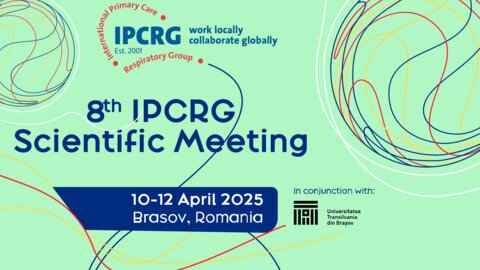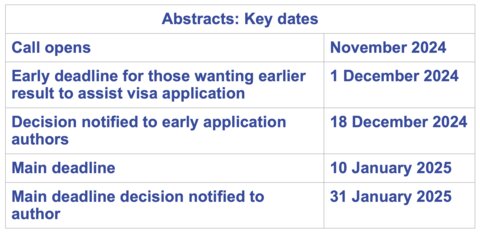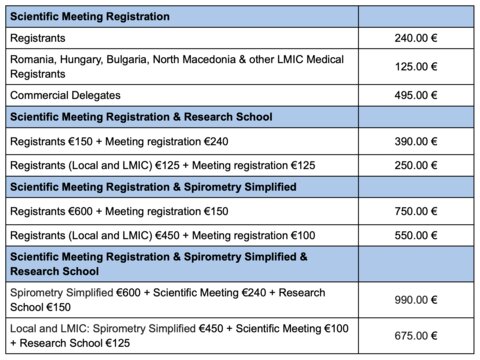IPCRG 8th Scientific Meeting

Our 8th IPCRG Scientific Meeting will took place in Brașov, Romania, on Friday 11 and Saturday 12 April 2025 in conjunction with RespiRO team, our Romanian Group co-led by Catalina Panaitescu and Cristina Isar. This followed our successful Scientific Meeting in Munich in 2023, and of course our World Conference in Athens 2024. We were pleased to again to see many researchers, especially those early in their careers, at this meeting.
The annual meeting of FRESHAIR4Life took place on Thursday 10 April and the IPCRG Implementation Science Research School took place on Saturday 12 April 2025, immediately after the Scientific Meeting. Another Spirometry Simplified course also took place on 12 April, with several side meetings taking place before ands throughout the meeting.
The 8th IPCRG Scientific Meeting will took place at and in conjunction with the Transilvania University of Brasov, represented by Andrea Neculau, and we are grateful for the support offered both by RespiRO and Brasov Transilvania University, for co-ordinating this meeting.
Accreditation
The 8th IPCRG Scientific Meeting, Brașov, Romania, has been accredited by the European Accreditation Council for Continuing Medical Education (EACCME®) with 10.0 European CME credits (ECMEC®s) and by the European Board for Accreditation in Pneumonology (EBAP) for 9.5 CME credits. You can use these credits in your Continuous Professional Improvement (CPD) programmes. Each medical specialist should claim only those hours of credit that he/she actually spent in the educational activity.
Abstracts

Please note that the call for abstracts has now ended. The information below is left as a record only and no new submissions will be accepted.
Who can submit an abstract?
Our audience is academics, clinicians and patient representatives working in primary care settings. Therefore the IPCRG welcomes abstracts from academics and all members of the multi-professional team, including patients & patient representatives, so long as it is relevant to this global primary care respiratory community. Topics should be related to the prevention, diagnosis, management & palliation of communicable & non-communicable respiratory diseases & respiratory risk factors in primary and community settings. Abstracts are a maximum of 300 words and may include one figure or table. The call for abstracts is now open.
For the first time, we are accepting abstracts for Creative Enquiry Presentations: expressing the lived experience through creative or artistic media to help think creatively in primary care. This can be proposed in all 3 abstract categories. Simply tick the ‘creative communications’ box if you wish to present in this format. Examples of this sort of presentation can be found here.
In 2025, we are also encouraging abstracts on clean air and air pollution, tobacco use and vaping prevention and cessation, planetary health, health equity, adolescent health and the use of social media for health information. This aligns with IPCRG’s partnership in the FRESHAIR4Life project funded by Horizon Europe and UKRI, and compliments our own strategic objectives. Abstracts are welcome from all researchers on these topics, as well as FRESHAIR4Life members so that we can facilitate and build a supportive network in this important field.
Abstract categories
Clinical Research Results
- Your abstract may be a summary of the findings of exploratory, effectiveness or implementation research that addresses a clinical question and uses a research method. You must include data and the work must be relevant to a primary care audience with an interest in respiratory health. Bear in mind that the IPCRG campaigns for patient care to be evidence-based, using evidence from real life, that includes populations representative of primary care populations.
- The questions from our Research Prioritisation exercise provide a useful guide to what would be of most interest to our audience.
- Use the IMRaD format (meta-analyses may require a different format), including an Introduction, Method, Results and Discussion.
- See abstracts guide appendix 1 for detailed guidance and information
Research Ideas
- The Research ideas category is for proposals for research that has been carefully planned but is yet to be conducted. This can include protocols for approved research, which may already be underway.
- The abstract should include the Research question, Background, Methodology and Questions to discuss.
- The IPCRG actively encourages primary care practitioners to submit an abstract, being aware that there are few academic centres of primary respiratory care and that there is no global database of primary care respiratory research in progress. We would be delighted to receive abstracts describing a research question and a methodology that can then benefit from peer discussion and challenge to increase research capability in primary care respiratory research.
- The questions from our Research Prioritisation exercise are a good starting point for your research ideas, and ideas can include air quality, tobacco use and dependence, physical activity, breathlessness, cough, asthma, COPD, multi-morbidity including chronic respiratory disease, respiratory infections including TB, RSV, COVID-19 and post-COVID syndrome.
- See abstracts guide appendix 2 for detailed guidance and information
Service Development & Evaluation
- Service Development & Evaluation Abstracts should evaluate an intervention to create and/or improve a service or interventions that benefit respiratory health, including educational interventions and quality improvement programmes. This can include surveys.
- It should include the aim, outline of context, a brief description of the change and why you thought it would work, your strategy for change, impact and lessons learned.
- See abstracts guide appendix 2 for detailed guidance and information
Guide to abstract submission
Word Count & Format: There is a maximum of 300 words allowed for the body of the abstract.
Figures and tables: You may include one image or table to illustrate the work further. Please ensure that you have permission to use any images that you display in your abstract submission; otherwise, you may be liable for copyright infringement and associated charges. Images can be in any format and up to 5MB in size. Any patient-identifiable images must have the patient’s written permission for display. Note on adding tables and images: Tables and Diagrams can be uploaded added and added as supporting files and not to the abstract’s body text. Tables or Diagrams should be uploaded as jpg. or png. files and clearly labelled e.g. 1) Tables: Table 1 – Table title 2) Diagrams: Figure 1 - Figure Title.
Abstracts should be written in full sentences in English: A correct sentence structure and grammar must be used and please check your spelling. Abstracts must be written in plain English. If this is your second language, please have your abstract proofread by a colleague with good written English skills.
Review Process and Outcome: All abstracts will be peer-reviewed and authors submitting by the main deadline of 10 January 2025 will be notified of the outcome by 31 January 2025.
If you wish your abstract to be reviewed early, to help with your visa, funding or travel arrangements please submit by 1 December 2024. Abstracts submitted by 1 December will be notified of the outcome by 18 December 2024.
All abstracts with author permission will also be added to IPCRG online resources and IPCRG will disseminate these to its network.
